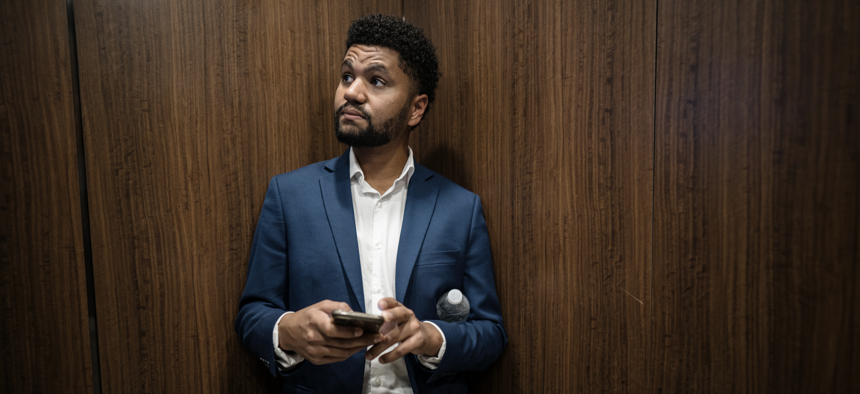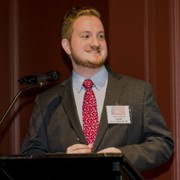Five Questions with Maxwell Frost
Frost, who's seen his national political profile skyrocket, may well be the first member of Gen Z to be elected to Congress in November.

Maxwell Frost rides an elevator on his way to be interviewed on a podcast in Orlando, The Uber driver and Gen Z candidate for Florida's 10th Congressional District won a crowded Democratic primary and is favored to win the general election in a heavily blue district. Photo by Thomas Simonetti for The Washington Post via Getty Images
After winning a nine-candidate Democratic primary in Florida’s 10th Congressional District, Maxwell Frost has seen his national political profile skyrocket. He’s been featured in dozens of national publications and heralded as likely the first member of Gen Z to be elected to Congress in November. That projection is for good reason: Frost won that primary by nine points in a field that included established politicians like state Sen. Randolph Bracy and former U.S. Reps. Alan Grayson and Corrine Brown. FiveThirtyEight gives him an over 99% chance at winning his Nov. 9 contest against Republican Calvin Wimbish because of the district’s heavily blue slant.
The congressional seat would be Frost’s first time in elected office, but he has done work in political organizing since he was 15. He has held positions in advocacy organizations in Florida and nationally, including working as a Field Manager during ACLU of Florida’s advocacy efforts for the Voting Rights Restoration for Felons Initiative in 2018, his almost two-year stint as organizing director at March for Our Lives, and national organizing specialist for the ACLU based in South Carolina. With that, City & State has five questions for Maxwell Frost (questions and answers have been edited for clarity and brevity):
What do you think your primary victory says about the constituents of the 10th Congressional District and what you offer that separated you from the pack?
I think a lot of it has to do with our message and it in the context of what's been going on this year. It's been a very rough year, especially for marginalized communities with our governor scapegoating vulnerable communities because he hasn't been able to actually fight for people here. We have one of the worst affordable housing crises in the country here in Central Florida. Our governor has done nothing to combat that. Gun violence is ravaging our communities, it has gone up over 15% since COVID started, our governor is doing nothing to stop that. But what he is doing is saying all of these issues you're experiencing are the fault of queer folks in classrooms talking about themselves, or kids being made to feel uncomfortable because we're talking about the actual history of our country and slavery.
This campaign, I think, has been hopefully a beacon of light for folks, especially here in Central Florida, as we talk about the future that we want to build together. It's not like a Democrat versus Republican thing. It's the people versus the problem. And I think that has been very refreshing for folks that you can elect a bold leader who's been doing the work on the ground that doesn't fit the typical caricature of what a congressional candidate looks like. I think that's why we were able to build the broad coalition we needed to win.
What insights did your involvement with March for Our Lives and other organizations give you about politics and how would you bring that to Congress?
March for Our Lives taught me so much. Being the national organizing director there, I got to work with young people across the country on different issues, municipal issues, ensuring that we're getting money to communities. I slept overnight in the Virginia State Capitol because we got death threats the day before and we still wanted to lobby for safe gun laws. I've been able to just see how these issues manifest themselves across the entire country. When I worked at the ACLU, I learned what it means to work with folks who might disagree with you. The ACLU is a nonpartisan organization about protecting civil rights and civil liberties. With them, I was really able to learn how our civil rights and civil liberties are under attack at many different levels and how it impacts our society, whether it is voting access or someone being able to access safe and legal abortions.
I believe every interaction we have throughout our life compiles to create the person we are right now. From knocking on doors in Charleston, South Carolina with the ACLU to knocking on doors here in Florida with ACLU of Florida, I've just gotten to meet hundreds and hundreds and hundreds of people and learned about how these issues impact their day-to-day life. And that's something I'm gonna carry with me as a member of Congress.
A lot of the media coverage about you has been centered on how you could be the first member of Gen Z in Congress. How do you think younger generations not receiving much representation in Washington has affected decision making and young people’s enthusiasm about politics?
When you go to vote, it's just great to see somebody who looks like you and who is going through the same things as you. Millennials and Gen Z make up over a third of this country, yet we are not really represented on the federal, municipal or county levels. Look, I'm not one of these people that says we need to clean house and get everyone out and replace it with a bunch of Gen Z’ers. My take is we have a Congress that looks like the country and that means race, yes, but it also means age and experience.
Having more working class families at the table, I think that's important for legislating, because when you sit down to think about what laws we're going to pass for our society, we have to have people who have been through it. Imagine if we had a Congress that had a majority of people who understand the urgency of gun violence, who have been through it themselves. Imagine if we had a Congress that had a significant block of people who faced eviction or who have been dealing with rising rent costs. We'd probably have something done quicker on ensuring that families can stay in their home. For me, it's about understanding the issue and our urgency around solving it. I will go to Congress with the urgency this issue deserves.
As a progressive candidate, how would you want to change the direction of policy pursuits in your party if elected? What policy issue would be your first priority if elected?
When we look at these issues, we've got to take a step back and look at how they holistically impact each other. When we want to reduce gun violence, we look at controlling weapons and ensuring that they don't get in the wrong hands. We also know that gun violence isn't just an issue, it's the symptom of other issues. A lot of these crimes are crimes of condition. When we raise the standard of living, when people have health care, when people have a dignified wage, when people have the ability to provide for their families, they're less likely to use a gun to solve their problems.
When I get into office, I want to work out protecting our democracy and ensuring that the right to vote is an actually accessible right. There are places in this country where it is easier to get an (assault rifle) than to go and vote. It's important that we have folks in Congress who won't get scapegoated into thinking that one issue impacts only one thing. Everything works together in concert to make the world we want to make but also it's what creates the horrible conditions that sometimes we find ourselves in.
Several Florida Democrats are locked in tight races against Republican incumbents. Do you believe it’s possible to energize Democratic voters to flip some of those offices?
I think all of that has to do with the message and really meeting people where they're at. That's something we did here. We actually had supporters who were conservative supporters, right, Republicans who were really excited about this campaign, who donated, who helped out, because they really trust me and understand that this really should be the future of politics here in Florida.
I think it's important that candidates really stick to a message that is very simple. … For me, it was really talking about the fact that I believe we all deserve to be healthy, and to be healthy in this country you need health care and that being human is enough to deserve it. I think that should be enough. When you have that conversation with people, Republicans, Democrats, moderates, conservatives, whatever, most people get behind that. It is also important to contact people who usually don't vote. The only way we're going to expand the electorate is by expanding the people we speak with and reaching new demographics. I think getting creative and working at bridging the gap with undercontacted voters could be the difference in Florida.
Contact Tristan Wood at twood@cityandstatefl.com and follow him on Twitter: @TristanDWood
NEXT STORY: This week’s biggest Winners & Losers
